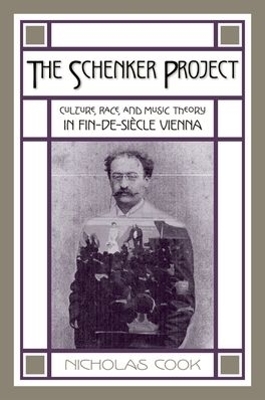
The Schenker Project
Culture, Race, and Music Theory in Fin-de-siecle Vienna
Seiten
2010
Oxford University Press Inc (Verlag)
978-0-19-974429-9 (ISBN)
Oxford University Press Inc (Verlag)
978-0-19-974429-9 (ISBN)
This book interprets the music theory of Henrich Schenker (1868-1935) as part of a comprehensive project encompassing not just musical reform but social and political critique. It sets his work into the contexts of Viennese modernism, German cultural conservatism, and Schenker's position as a Jewish immigrant to the city where modern anti-semitism first developed.
Today we think of Heinrich Schenker, who lived in Vienna from 1884 until his death in 1935, as the most influential music theorist of the twentieth century. But he saw his theoretical writings as part of a comprehensive project for the reform of musical composition, performance, criticism, and education-and beyond that, as addressing fundamental cultural, social, and political problems of the deeply troubled age in which he lived. This book aims at an understanding of Schenker's project through reading his key works within a series of period contexts. These include music criticism, the field in which Schenker first made his name; Viennese modernism, particularly the debate over architectural ornamentation; German cultural conservatism, which is the source of many of Schenker's most deeply entrenched values; and Schenker's own position as a Galician Jew who came to Vienna just as traditional anti-semitism was becoming fully racialized. As well as presenting an unfamiliar perspective on the cultural and political ferment of fin-de-siècle Vienna, this approach reveals how deeply the social and political were thought into Schenker's theory. It also raises issues concerning the meaning and value of music theory, and the extent to which today's music-theoretical agenda unwittingly reflects the values and concerns of a very different world.
Today we think of Heinrich Schenker, who lived in Vienna from 1884 until his death in 1935, as the most influential music theorist of the twentieth century. But he saw his theoretical writings as part of a comprehensive project for the reform of musical composition, performance, criticism, and education-and beyond that, as addressing fundamental cultural, social, and political problems of the deeply troubled age in which he lived. This book aims at an understanding of Schenker's project through reading his key works within a series of period contexts. These include music criticism, the field in which Schenker first made his name; Viennese modernism, particularly the debate over architectural ornamentation; German cultural conservatism, which is the source of many of Schenker's most deeply entrenched values; and Schenker's own position as a Galician Jew who came to Vienna just as traditional anti-semitism was becoming fully racialized. As well as presenting an unfamiliar perspective on the cultural and political ferment of fin-de-siècle Vienna, this approach reveals how deeply the social and political were thought into Schenker's theory. It also raises issues concerning the meaning and value of music theory, and the extent to which today's music-theoretical agenda unwittingly reflects the values and concerns of a very different world.
Nicholas Cook is Professor of Music at Cambridge University. He was Professorial Research Fellow in Music at Royal Holloway, University of London, where he directs the AHRC Research Centre for the History and Analysis of Recorded Music (CHARM). He is the author of articles and books on a wide variety of musicological and theoretical subjects (his Music: A Very Short Introduction has been translated into ten languages). He was elected Fellow of the British Academy in 2001.
ACKNOWLEDGEMENTS; ABBREVIATIONS; INTRODUCTION: SCHENKER'S CONTEXTS; CONCLUSION: MUSIC THEORY AS SOCIAL PRACTICE; LIST OF REFERENCES; APPENDIX: 'THE SPIRIT OF MUSICAL TECHNIQUE', TRANSLATED BY WILLIAM PASTILLE; INDEX
| Erscheint lt. Verlag | 24.5.2010 |
|---|---|
| Zusatzinfo | 34 haltones, 6 line drawings |
| Verlagsort | New York |
| Sprache | englisch |
| Maße | 234 x 156 mm |
| Gewicht | 513 g |
| Themenwelt | Kunst / Musik / Theater ► Musik ► Musiktheorie / Musiklehre |
| Sozialwissenschaften ► Soziologie ► Spezielle Soziologien | |
| ISBN-10 | 0-19-974429-7 / 0199744297 |
| ISBN-13 | 978-0-19-974429-9 / 9780199744299 |
| Zustand | Neuware |
| Haben Sie eine Frage zum Produkt? |
Mehr entdecken
aus dem Bereich
aus dem Bereich
Grundbegriffe, Harmonik, Formen, Instrumente
Buch | Softcover (2021)
Philipp Reclam (Verlag)
CHF 12,90
Jazz als Gegenkultur im westlichen Nachkriegsdeutschland
Buch | Hardcover (2024)
edition text + kritik (Verlag)
CHF 57,90


